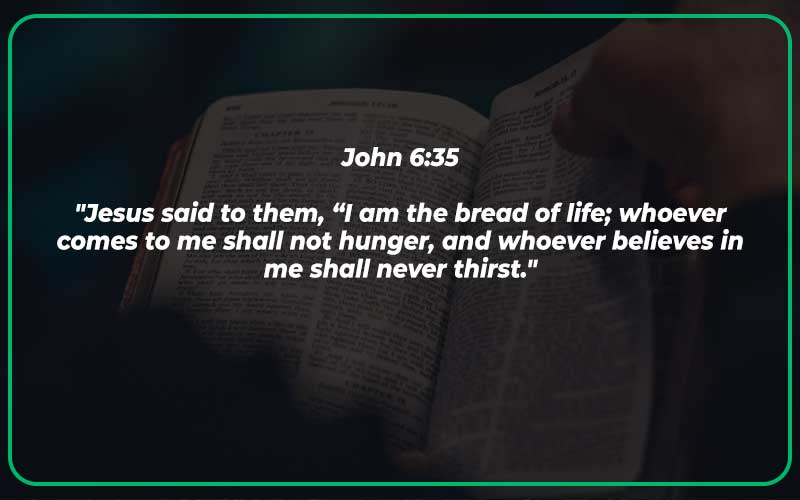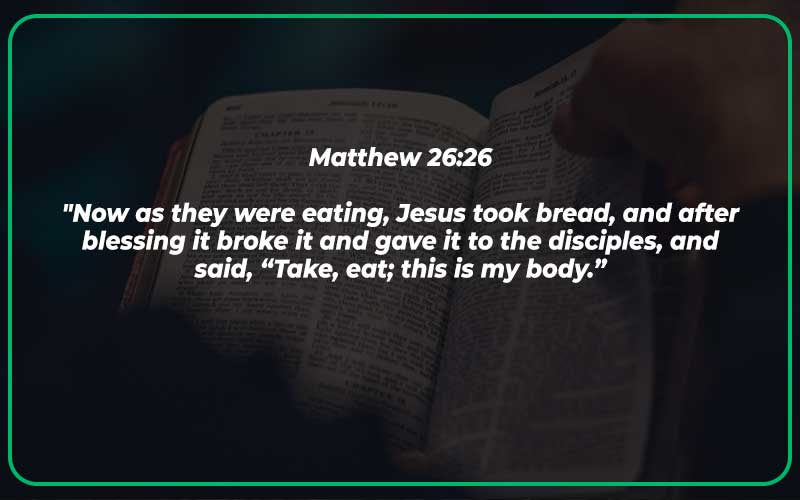Food is a gift from God that sustains and nourishes our bodies. The Bible contains verses that acknowledge the significance of food and its role in our lives.
In this blog post, we will explore these verses, uncovering the spiritual insights and lessons they offer.
From the symbolism of bread to the call to gratitude for provision, these verses will inspire you to view food through a lens of appreciation and mindfulness.
So, prepare your taste buds and join us on this flavorful journey through the pages of the Bible.
Also Read: Bible Verses About God’s Mercy
Bible Verses About Food
Genesis 1:29
“And God said, ‘Behold, I have given you every plant yielding seed that is on the face of all the earth, and every tree with seed in its fruit. You shall have them for food.'”
In the beginning, God created all the necessary elements for food and provided them for us. This verse makes it clear that God intended for us to consume a plant-based diet and that He made everything available to nourish our bodies.
Proverbs 31:15
“She rises while it is still night and provides food for her household and portions for her female servants.”
This verse details a virtuous woman who provides food for her family and servants. It highlights the importance of taking responsibility for nourishing our loved ones and those under our care.
Matthew 4:4
“Jesus answered, “It is written: ‘Man shall not live on bread alone, but on every word that comes from the mouth of God.’”
This verse reminds us that physical food is not the only source of sustenance we need to survive. We must also feed our spirits with the Word of God to thrive.
Mark 14:22
“And as they were eating, he took bread, and after blessing it broke it and gave it to them, and said, “Take; this is my body.”
This verse documents Jesus’s Last Supper with his disciples, where He blessed the bread before breaking it and giving it to them. This event laid the foundation for the practice of the Holy Communion, where we remember Jesus’s sacrifice and partake in His Body and Blood.
Acts 10:13-15
“And there came a voice to him: “Rise, Peter; kill and eat.” But Peter said, “By no means, Lord; for I have never eaten anything that is common or unclean.” And the voice came to him again a second time, “What God has made clean, do not call common.”
In this verse, Peter received a vision from God, instructing him not to label food unclean or defiled. This event ultimately led to the acceptance of Gentiles into the Christian faith. It demonstrates that through Christ, we are all equal, and nothing is impure if it nourishes our bodies.
1 Timothy 4:4-5
“For everything created by God is good, and nothing is to be rejected, if it is received with thanksgiving, for it is made holy by the word of God and prayer.”
This verse reinforces the notion that all good food is from God and should be received with gratitude. We must also remember to pray before every meal, asking God to bless and sanctify the food we eat.
Ecclesiastes 9:7
“Go, eat your bread with joy, and drink your wine with a merry heart, for God has already approved what you do.”
This verse encourages us to enjoy our food and drink with a joyful heart, knowing that God has approved of our actions. It reminds us to take pleasure in the fruits of our labor and to share our meals with others.
John 6:35
“Jesus said to them, “I am the bread of life; whoever comes to me shall not hunger, and whoever believes in me shall never thirst.”
Here, Jesus proclaims that He is the ultimate food for the soul. He offers eternal sustenance and promises to quench our spiritual thirst.

Psalm 119:103
“How sweet are your words to my taste, sweeter than honey to my mouth!”
This verse likens the Word of God to sweetness that nourishes and satisfies. It illustrates the importance of feasting on God’s Word to sustain and strengthen us.
Exodus 16:15
“When the people of Israel saw it, they said to one another, “What is it?” For they did not know what it was. And Moses said to them, “It is the bread that the Lord has given you to eat.”
In this verse, God provided manna to the Israelites during their journey through the wilderness. It emphasizes the provision and sustenance of God’s hand and how we can trust Him to provide sufficiently for our physical and spiritual needs.
John 21:12
“Jesus said to them, “Come and have breakfast.” Now none of the disciples dared ask him, “Who are you?” They knew it was the Lord.”
This verse recounts Jesus’s appearance to His disciples after His resurrection. He had already prepared breakfast for them, inviting them to eat with Him. It demonstrates Jesus’s love and care for His followers and His desire for us to enjoy meals in community with one another.
Psalm 104:14-15
“You cause the grass to grow for the livestock and plants for man to cultivate, that he may bring forth food from the earth and wine to gladden the heart of man, oil to make his face shine and bread to strengthen man’s heart.”
In this verse, God provides for us by causing plants to grow and producing fruits, grains, and vegetables for our consumption. He also gave us wine and oil, adding richness and flavor to our meals.
Romans 14:2
“One person believes he may eat anything, while the weak person eats only vegetables.”
This verse acknowledges the difference in believers’ perspectives towards food and dietary choices. It emphasizes respecting one another’s convictions while remembering that the Kingdom of God is not a matter of eating or drinking, but of righteousness and peace and joy in the Holy Spirit (Romans 14:17).
Luke 10:8
“Whenever you enter a town and they receive you, eat what is set before you.”
This verse reminds us to embrace hospitality and receive what is offered to us, not to be picky or demanding. It demonstrates a willingness to experience new foods and cultural differences with grace and gratitude.
Leviticus 11:2-3
“Speak to the people of Israel, saying, These are the living things that you may eat among all the animals that are on the earth. Whatever parts the hoof and is cloven-footed and chews the cud, among the animals, you may eat.”
This verse details the specific guidelines that God gave to the Israelites regarding clean and unclean animals. It served as a way to segregate them from the pagan cultures and to promote their health and wellbeing.
Deuteronomy 14:3-4
“You shall not eat any abomination. These are the animals you may eat: the ox, the sheep, the goat.”
This verse echoes the dietary laws outlined in Leviticus and reminds us that certain foods are designated as unclean or inappropriate for human consumption.
Daniel 1:12
“Test your servants for ten days; let us be given vegetables to eat and water to drink.”
In this verse, Daniel and his friends requested a plant-based diet to avoid eating the king’s food, which was considered unclean. This event highlights the importance of staying true to our convictions and making choices that align with our beliefs, even if it means going against cultural norms.
Isaiah 55:1
“Come, everyone who thirsts, come to the waters; and he who has no money, come, buy and eat! Come, buy wine and milk without money and without price.”
This verse invites us to partake in the nourishment of God without cost, stressing that we can approach Him and receive the spiritual sustenance we require freely.
Matthew 26:26
“Now as they were eating, Jesus took bread, and after blessing it broke it and gave it to the disciples, and said, “Take, eat; this is my body.”
Here again, Jesus demonstrates the symbolism of the bread as His Body, which will be broken for His followers. This event reminds us that our physical nourishment is fleeting, and it is only through Jesus that we can receive eternal sustenance.

What Scripture says about growing food?
The Bible emphasizes the importance of agriculture and cultivation as a means of sustenance and stewardship of the land. In the creation story in Genesis, God instructs Adam and Eve to tend the Garden of Eden, which signifies the value of growing food and caring for the earth. Moreover, the Bible contains numerous parables and teachings related to agriculture, using agricultural imagery to convey spiritual truths.
One prominent passage addressing the concept of growing food is found in 1 Corinthians 3:6-7 (NIV):
“I planted the seed, Apollos watered it, but God has been making it grow. So neither the one who plants nor the one who waters is anything, but only God, who makes things grow.”
This verse speaks to the collaborative effort involved in farming, where different individuals play various roles, but ultimately, it is God who brings forth the growth. It reminds believers of their dependence on God’s providence, not just in agriculture but in all aspects of life.
Does God bless our food?
The Bible emphasizes that God is not only the provider of food but also the one who blesses it. In several instances, we find blessings offered before meals to acknowledge God’s provision and express gratitude for His gifts.
One of the most well-known blessings is the one Jesus offered before feeding the multitude in Matthew 14:19 (NIV):
“And he directed the people to sit down on the grass. Taking the five loaves and the two fish and looking up to heaven, he gave thanks and broke the loaves. Then he gave them to the disciples, and the disciples gave them to the people.”
In this miraculous event, Jesus multiplies the loaves and fishes to feed thousands of people, showcasing God’s abundant provision and blessing upon the food. This serves as a powerful reminder that God can take what seems insufficient and turn it into more than enough to meet our needs.
Additionally, in Proverbs 3:9-10 (NIV), we find a verse about honoring the Lord with our wealth and the firstfruits of all our crops:
“Honor the Lord with your wealth, with the firstfruits of all your crops; then your barns will be filled to overflowing, and your vats will brim over with new wine.”
This passage emphasizes the act of dedicating the first and best portions of the harvest to God, trusting in His faithfulness to bless the rest abundantly.
What is a quote about God and food?
One of the most profound quotes relating to God and food comes from Jesus’ response to Satan during His temptation in the wilderness. In Matthew 4:4 (NIV), Jesus declares:
“Man shall not live on bread alone, but on every word that comes from the mouth of God.”
This statement underscores the spiritual significance of food and its connection to our dependence on God. While physical nourishment is essential for survival, Jesus reminds us that spiritual sustenance is equally crucial. We need to feed our souls with God’s Word, seeking a deeper relationship with Him to find true fulfillment and purpose in life.
Conclusion
Food plays a pivotal role in the Bible, not only as a means of sustenance but also as a powerful metaphor for spiritual truths. The Bible contains verses that emphasize the goodness of the Lord, the importance of growing food, God’s blessings upon our meals, and the significance of seeking spiritual nourishment.
Through these scriptures, we are encouraged to recognize God’s provision, express gratitude, and deepen our relationship with Him by feasting on His Word.
As we engage in the act of eating, let us be mindful of the deeper meanings behind the food we consume and the spiritual hunger that can only be satisfied by tasting and experiencing the goodness of the Lord.

